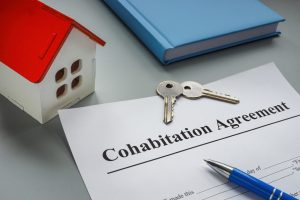Legal Blog
Cohabitation Agreements: Protecting Assets and Income of Unmarried Couples Residing Together in DC
 Unmarried couples residing together in the District of Columbia would be wise to execute a cohabitation agreement defining their rights and responsibilities to avoid substantial financial risk.
Unmarried couples residing together in the District of Columbia would be wise to execute a cohabitation agreement defining their rights and responsibilities to avoid substantial financial risk.
The District of Columbia is one of a small number of jurisdictions in the United States that recognize “common-law marriage.”
Contrary to popular belief, there is no minimum amount of time that couples must live together to form a common-law marriage. Instead, a couple forms a common-law marriage in the District of Columbia when there is cohabitation following an express mutual agreement, which must be in words of the present tense, to be permanent partners with the same degree of commitment as the spouses in a ceremonial marriage. A common-law marriage can be formed without any marriage ceremony or marriage license.
A well-drafted cohabitation agreement signed and notarized by both parties will unequivocally explain that the parties do not intend to form a common-law marriage. The agreement should also clarify that each party will retain their own assets and income and assume responsibility for their own debt if and when the relationship ends.
In the absence of a cohabitation agreement, one of the parties to the relationship might file a complaint for divorce in the Superior Court for the District of Columbia, asserting that the parties formed a common-law marriage. If the Court concludes that the parties formed a common-law marriage, the Court can order one party to pay spousal support to the other, depending upon the facts of the case. The Court can also equitably distribute property and debt acquired by the parties from the date of marriage to the date of divorce, except property acquired by gift or inheritance, and order one party to reimburse the other party for attorneys’ fees incurred in the divorce proceeding.
Even if the parties never formed a common-law marriage, the party who denies the existence of a common-law marriage will have to engage in lengthy and costly litigation to prove that the parties were never common-law married to avoid having his or her assets and income divided by the Court. The attorneys’ fees involved in defending against a false common-law marriage claim can be substantial.
To avoid costly and time-consuming litigation and protect your income and assets, anyone planning to reside with another person in a romantic relationship or already residing with another person in a romantic relationship should promptly seek the assistance of an attorney in preparing a cohabitation agreement.
ABOUT MARSHALL YAAP
 marshall.yaap@offitkurman.com | 240.507.1754
marshall.yaap@offitkurman.com | 240.507.1754
Marshall Yaap represents clients in domestic and international family law matters. His practice focuses on child custody, child support, divorce, property division, alimony, domestic violence cases, and marital and premarital contracts. Before entering private practice, Marshall served as a judicial law clerk at the Superior Court of the District of Columbia for retired Judge Odessa F. Vincent, Magistrate Judge Errol R. Arthur, and retired Magistrate Judge S. Pamela Gray. Prior to law school, Marshall worked for daily newspapers as a reporter and editor.
